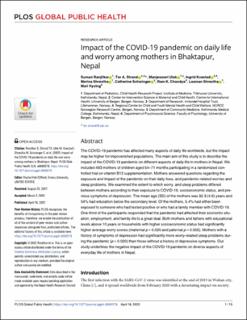| dc.contributor.author | Ranjitkar, Suman | |
| dc.contributor.author | Strand, Tor Arne | |
| dc.contributor.author | Chandyo, Manjeswori Ulak | |
| dc.contributor.author | Kvestad, Ingrid | |
| dc.contributor.author | Shrestha, Merina | |
| dc.contributor.author | Schwinger, Catherine | |
| dc.contributor.author | Chandyo, Ram Krishna | |
| dc.contributor.author | Shrestha, Laxman P. | |
| dc.contributor.author | Hysing, Mari | |
| dc.date.accessioned | 2022-12-28T11:19:41Z | |
| dc.date.available | 2022-12-28T11:19:41Z | |
| dc.date.created | 2022-05-06T07:17:23Z | |
| dc.date.issued | 2022 | |
| dc.identifier.issn | 2767-3375 | |
| dc.identifier.uri | https://hdl.handle.net/11250/3039627 | |
| dc.description.abstract | The COVID-19 pandemic has affected many aspects of daily life worldwide, but the impact may be higher for impoverished populations. The main aim of this study is to describe the impact of the COVID-19 pandemic on different aspects of daily life in mothers in Nepal. We included 493 mothers of children aged 54–71 months participating in a randomized controlled trial on vitamin B12 supplementation. Mothers answered questions regarding the exposure and impact of the pandemic on their daily lives, and pandemic-related worries and sleep problems. We examined the extent to which worry, and sleep problems differed between mothers according to their exposure to COVID-19, socioeconomic status, and previous symptoms of depression. The mean age (SD) of the mothers was 32.3 (4.6) years and 54% had education below the secondary level. Of the mothers, 5.4% had either been exposed to someone who had tested positive or who had a family member with COVID-19. One-third of the participants responded that the pandemic had affected their economic situation, employment, and family life to a great deal. Both mothers and fathers with educational levels above 10 years or households with higher socioeconomic status had significantly higher average worry scores (maternal p = 0.020 and paternal p = 0.005). Mothers with a history of symptoms of depression had significantly more worry-related sleep problems during the pandemic (p = 0.020) than those without a history of depressive symptoms. Our study underlines the negative impact of the COVID-19 pandemic on diverse aspects of everyday life of mothers in Nepal. | en_US |
| dc.language.iso | eng | en_US |
| dc.publisher | PLOS | en_US |
| dc.rights | Navngivelse 4.0 Internasjonal | * |
| dc.rights.uri | http://creativecommons.org/licenses/by/4.0/deed.no | * |
| dc.title | Impact of the COVID-19 pandemic on daily life and worry among mothers in Bhaktapur, Nepal | en_US |
| dc.type | Journal article | en_US |
| dc.type | Peer reviewed | en_US |
| dc.description.version | publishedVersion | en_US |
| dc.rights.holder | Copyright 2022 The Author(s) | en_US |
| dc.source.articlenumber | e0000278 | en_US |
| cristin.ispublished | true | |
| cristin.fulltext | original | |
| cristin.qualitycode | 1 | |
| dc.identifier.doi | 10.1371/journal.pgph.0000278 | |
| dc.identifier.cristin | 2021952 | |
| dc.source.journal | PLOS Global Public Health | en_US |
| dc.relation.project | Norges forskningsråd: 223269 | en_US |
| dc.identifier.citation | PLOS Global Public Health. 2022, 2(4), e0000278. | en_US |
| dc.source.volume | 2 | en_US |
| dc.source.issue | 4 | en_US |

